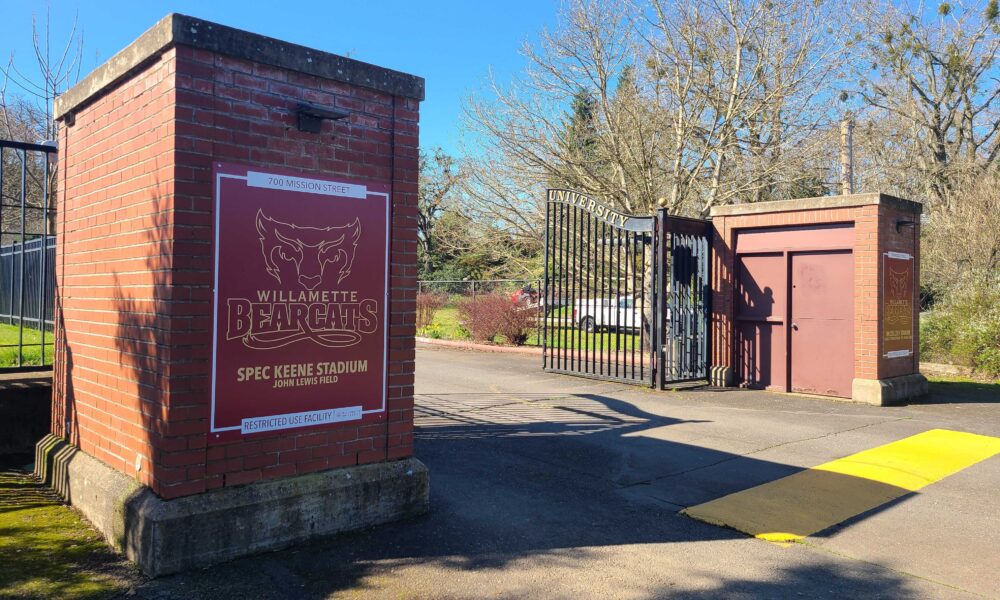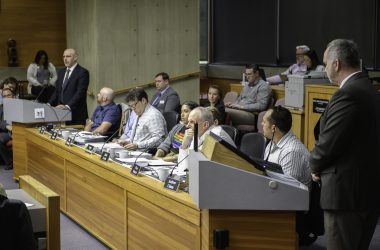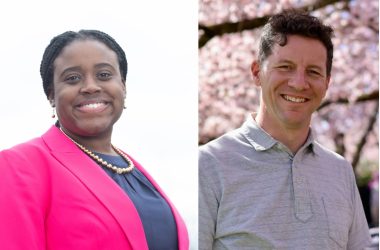A private company using unpaid college players plans to start a summer league team in the baseball stadium embedded in Bush’s Pasture Park in Salem.
The first ball won’t be thrown until the summer of 2025, but organizers have already successfully pitched legislators and Salem officials.
But the idea of summer evening ball play isn’t a winner with everyone. A subcommittee of a neighborhood association recently urged that “immediate and persistent action” is needed to address “adverse effects.”
The focus is Roy “Spec” Keene Stadium, built in 1989 on Willamette University property at the north edge of Bush’s Pasture Park. The park surrounds the ball field.
State legislators recently earmarked $3 million from taxpayers to pay for upgrading the stadium.
University officials propose to replace grass with artificial turf, install new and taller field lights, open more entryways and add field netting.
The university then would turn over the stadium for the summer to Salem Baseball LLC. The company is led by Luke Emanuel, a Salem native who worked eight years as director of baseball operations at the University of Oregon.
Emanuel’s company bought the Salem franchise for the West Coast League and wants Keene Stadium to be its home field. The league features college players who are between school seasons.
As Emanuel envisions the scene, up to 1,500 fans would settle into stadium seats for 27 home games a season. They’d have access to concessions, including beer, and likely pay no more than $10 for a ticket to a game, Emanuel said.
“This can benefit local businesses, including restaurants, hotels and shops.”
–Scott Archer, Salem deputy city manager
He’s been working on the vision for more than two years, forming his company in 2022. The ownership is shared with a “silent partner” Emanuel doesn’t want to identify.
To ensure equity, Willamette University also will install artificial turf and lights on the university’s softball field, which is on the campus of nearby Tokyo International University.
Emanuel’s company and Willamette also struck a deal with the city of Salem in December, committing the city to explore the project but put up no money.
The baseball project has strong fans at City Hall.
“The improvements should attract positive uses of the park and bring additional people into our Salem community,” said Scott Archer, Salem deputy city manager. “This can benefit local businesses, including restaurants, hotels and shops.”
Rob Passage, Willamette’s athletic director, sees only good coming from adding a ball team during the summer. He also said local high school teams would now have access to an all-weather field in town.
“This is going to be a great thing for Salem,” Passage said.
The project for rebuilding both fields will cost an estimated $6.3 million, according to an application that Willamette submitted in February to legislators. Willamette asked for $3 million in state money.
The request came with a host of endorsing letters. The Salem-Keizer School District’s coordinator of athletics said high schools expect to rent the fields “on a regular basis.”
The Boys & Girls Club of Salem Marion and Polk Counties said it anticipated using the ball field for summer camp, flag football and fundraising tournaments. The Family YMCA of Marion & Polk Counties said the project would “provide space for youth and adults to participate in multi-sport camp programs.”
Upgrading the fields would help Salem’s economy, Travel Salem said in its letter.
“The positive ripple effects of this investment will be felt through increased tourism, local business engagement, and the overall enhancement of Salem’s reputation as a sports destination,” the organization wrote.
Emanuel advised legislators that half the money needed had already been raised.
“An award of $3 million from the state will green light this project,” he wrote. “Our $3 million request is for the last portion remaining for us to complete this project.”
He focused legislators on youth in Salem.
“The youth of Salem-Keizer desperately need more year-round safe outdoor space,” he wrote. “Outdoor play, particularly within team sports, provides valuable asset-building to prepare kids for life. Assets like managing anxiety, stress, developing self-worth, discipline, enduring failure and growing from it, teamwork to name a few.”
Legislators approved the grant.
The request to the state detailed the source for the remaining $3.3 million.
Passage said Willamette had in hand both the $1.5 million it committed and another $300,000 raised from private donors. He said additional donations are still being sought.
Emanuel’s company is listed as providing $1.5 million.
Willamette doesn’t have that money yet but “we have faith the money is there,” Passage said.
Emanuel said his company has a contract with Willamette and that “we have a financial commitment” for its share of the costs. He declined to elaborate.
Meantime, Willamette is already spending money on the project, hiring a landscape architect to design the field project.
That work is needed to obtain city permits, where the project faces land use requirements and a historic design review. The project also has to fit the management plan that governs Bush’s Pasture Park, which started out as a 57-acre parcel donated to the city in 1917. The remaining acreage was added to the park in 1953.
Passage said that nearly two years ago he and Emanuel met with the board of the South Central Association of Neighbors, the city neighborhood group that includes the park. He said the board then supported the concept and did so again by supporting the agreement with the city to pursue more detailed plans.
He said he has taken people for walking tours to explain what’s coming and “those all have seemed to end positively.”
Passage and Emanuel realize that evening parking for ball games could be a challenge.
Emanuel said the city parking lot along Mission Street can hold about 200 of the 500 or so vehicles expected from fans. He said other spots are available along Southeast High Street on the park’s west side as well as parking lots on the south side of the park.
He hopes to arrange with nearby businesses to use their lots after hours for baseball traffic.
“I don’t see it as a huge challenge,” Emanuel said, but “walking will be a requirement.”
The two also have been questioned about new stadium lighting, which city records show would be taller than existing lights.
Emanuel said modern field lights are less intrusive than what people may be accustomed to. And Archer, the deputy city manager, said lighting systems now use “advanced technology, controls and precise aiming to minimize light pollution.”
The park itself automatically closes each day at sunset, which can be 9 p.m. in July. Emanuel said games would start at 6 p.m. or so.
The Historic Preservation Parks and Garden Committee, part of the South Central Association, said so many fans showing up for ball games could “impede other public access” and could cause “irreversible damage to the already threatened cultural landscape” of the park.
Some neighbors also are concerned about “nighttime noise, light pollution and other impacts inherent to commercial activity.”
Passage said Willamette hears the concerns.
“We will continue to engage with the neighbors,” he said. “They are obviously concerned about the impact on the park, the additional visitors it might bring. They are concerned about traffic. We are very committed to controlling that.”
As the plan develops, “there will be multiple opportunities for public comment,” said Archer, the deputy city manager. The next time will be Thursday, April 11, when stadium proponents will appear before the city Parks and Recreation Advisory Board.
“I have heard grumblings that we are trying to do this under a shroud of secrecy,” Passage said. “We’re out there. We are open to conversations.”
STORY TIP OR IDEA? Send an email to Salem Reporter’s news team: [email protected].
SUPPORT OUR WORK – We depend on subscribers for resources to report on Salem with care and depth, fairness and accuracy. Subscribe today to get our daily newsletters and more. Click I want to subscribe!

Les Zaitz is editor and CEO of Salem Reporter. He co-founded the news organization in 2018. He has been a journalist in Oregon for nearly 50 years in both daily and community newspapers and digital news services. He is nationally recognized for his commitment to local journalism. He also is editor and publisher of the Malheur Enterprise in Vale, Oregon.









